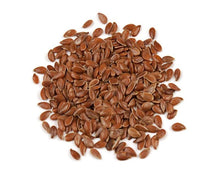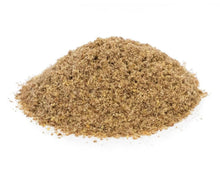Use of Flax Seeds for Menopause Symptoms Relief
Flax Seeds - Linum usitatissimum L.
Origin: Brazil
Used part: Seed
Description:
This seed originated in Asia comes from flax (Linum usitatissimum) and has a high nutritional value and is widely used in cooking. Because of this, it is considered a functional food. But it is not new, since there are records of flaxseed 5000 years before Christ in Mesopotamia. Over time, this herbaceous was spread by the world and became common also in North America and in European countries.
There are two types of seeds produced by flax: the dark brown, most used industrially and in pharmacies and from where the linseed oil is extracted, and the golden-yellow ones, most used for food and medicinal consumption.
Health benefits:
Flaxseed is composed of carbohydrates, proteins, saturated fats, trans fats, dietary fiber, sodium and omega 3 and 6. Flaxseed is one of the largest dietary sources of lignans, estrogen-like phytochemicals. It also contains high concentrations of vitamins B1, B2, C, E and Carotene, plus minerals like iron, zinc, and some amount of potassium, magnesium, phosphorus and calcium.
To deal with the disorders of estrogen and progesterone, a situation counteracted by essential fatty acids, it is worth betting on the power of flaxseed. To relieve some symptoms of menopause, flaxseed can also be an excellent tool. A study with the participation of 25 menopausal women shows that the consumption of at least 40 grams of flaxseed per day works with the same potential of hormone replacement therapy, with the advantage of not triggering any type of side effect.
The use of flaxseed, according to studies by scientists at the University of Oklahoma in the United States, is positive for women who are at the end of reproductive life as it works to increase antioxidant activity. Flaxseed vegetables, precursors of mammalian lignans, and alpha-linolenic acid can, by blocking the production of prostaglandins, help prevent bone loss and osteoporosis. Despite the encouraging results, scientists estimate that flax seed may present far more benefits to the health of those who are known to date.
Good Herbal Remedy:
- It is antioxidant
- It is anticancer
- It has high rates of soluble fibers, which are used as a laxative and aid in digestion
- It has vitamins B1, B2, C and E
- Contains carotene, iron, zinc, potassium, magnesium, phosphorus and calcium
- Flaxseed oil is rich in omega 3 foods in the wild, but it also has omega 6 and omega 9
- It works on cholesterol reduction
- It balances the thyroid hormones
- It regulates the intestine, because of the fibers
- It improves the immune system
- It eases the symptoms of menopause
- Helps control diabetes
- Fights and prevents acnes
- It works by combating various digestive and respiratory disorders
- Prevents clogging of the arteries by fats, preventing heart disease
- Combats premature aging and degenerative diseases
- It ends with the symptoms of menstruation (or at least softens)
- Prevents breast cancer
Directions:
There are several ways to consume flaxseed, but experts recommend flaxseed crushing, since its bark is often very resistant in our body, making it difficult to absorb its nutrients. However, it should be consumed immediately after grinding, since the grains are usually susceptible to oxidation.
Two tablespoons, beaten in the blender and processed into bran are sufficient for daily consumption. Mix with other foods (with fruit or juice, look great) or eat pure, morning and afternoon. If you do not consume immediately, keep the glass tightly closed in the refrigerator for a maximum of one week.
Contraindications:
It is important to remember that flaxseed oil is contraindicated in pregnancy because it can cause premature labor.






